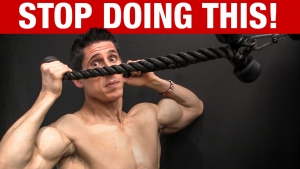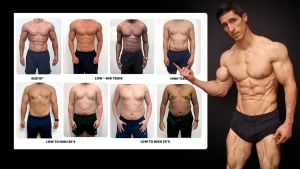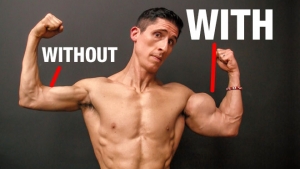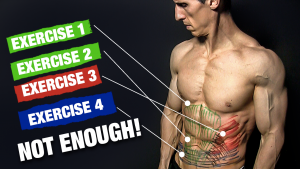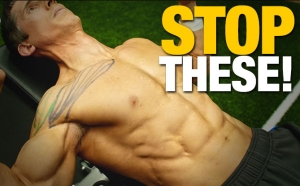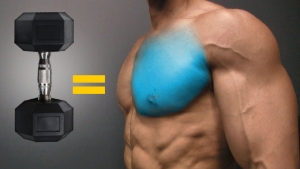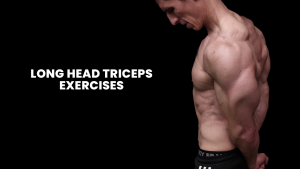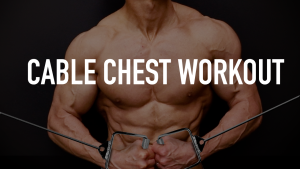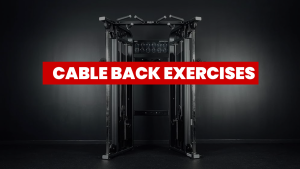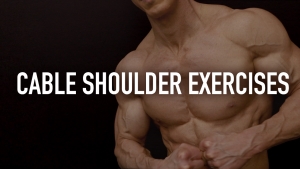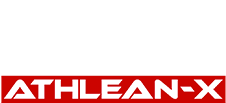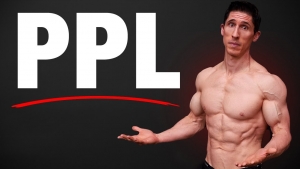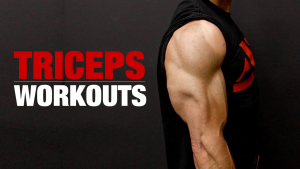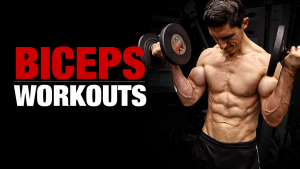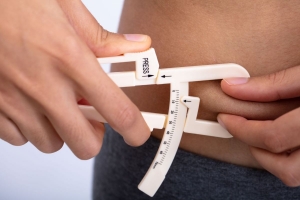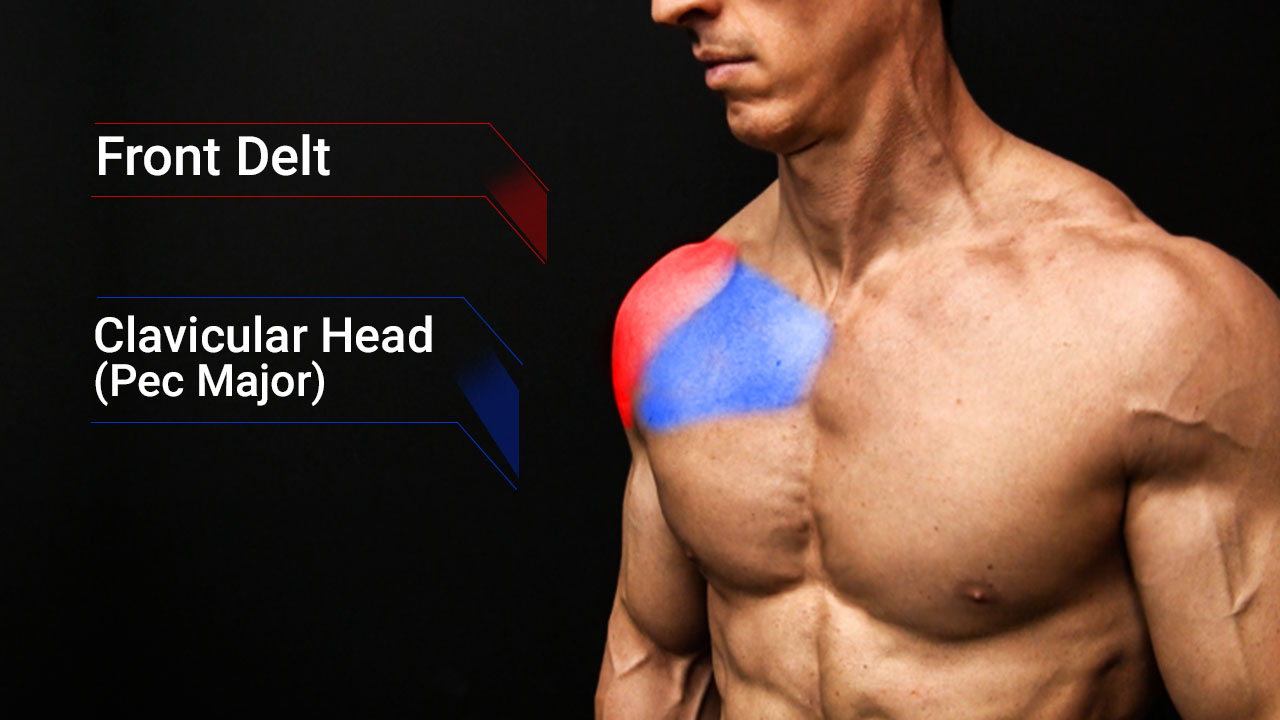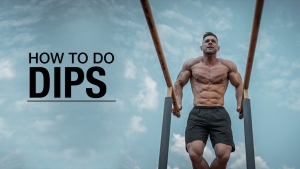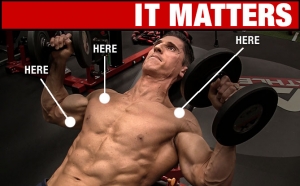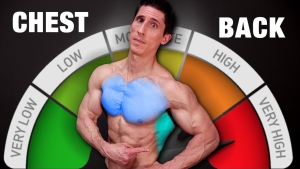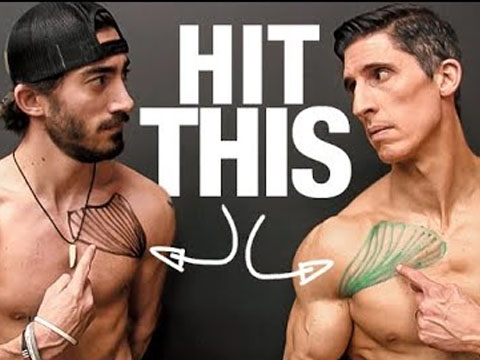
BEST UPPER CHEST WORKOUT
The upper chest is an area that a lot of guys struggle to develop. It doesn’t have to be that way!
You’ve probably been doing inclined bench presses to build your upper chest muscles…
And maybe it’s not growing like you wish it would.
If the incline dumbbell bench press exercise is supposed to be the ‘go-to’ upper chest exercise, why isn’t it resulting in the muscle growth you’re looking for?
I’m about to show you why that is.
It’s the reason why doing workouts made up of carefully selected upper chest exercises based on the actual science plays such a crucial role, but we’ll get back to that in a minute.
You see, unlike other areas of the chest, the upper pecs (the top half that starts up at the collarbone) allow for a degree of targeting that other areas of the pectoralis major muscle do not.
This means that if yours are lacking fullness, the right exercises and advanced techniques for building the upper chest muscles will fix it!
You just need to make your anatomy work to your advantage, adhering to the principle of following the fibers, and you’ll see how it is possible to build the upper chest muscles much more quickly than with incline presses alone.
I’ll give you 8 different exercise options here to help you get the job done:
- Bodyweight
- Weighted
- Beginner
- Advanced
No excuses. It’s time to hit those upper pecs with a heavy dose of science!
HOW TO TARGET THE UPPER CHEST
Let’s take a look at the anatomy of the upper pecs so that it’s easier for you to understand how following the fibers is the key to a bigger chest.
When we’re talking about the ‘upper chest’, we’re referring to the clavicular head of the chest muscle that has attachments at the clavicle and the humerus or upper arm bone. This upper portion of the pec major is separately innervated, which allows us to be able to target this area more specifically than any other area of the chest.
The direction of the fibers in the clavicular head run from up and in toward the clavicle to down and out toward the upper arm. In other words, when your arm is placed at your side and away from your body, the upper pecs are responsible for bringing it up and across your body at a diagonal.

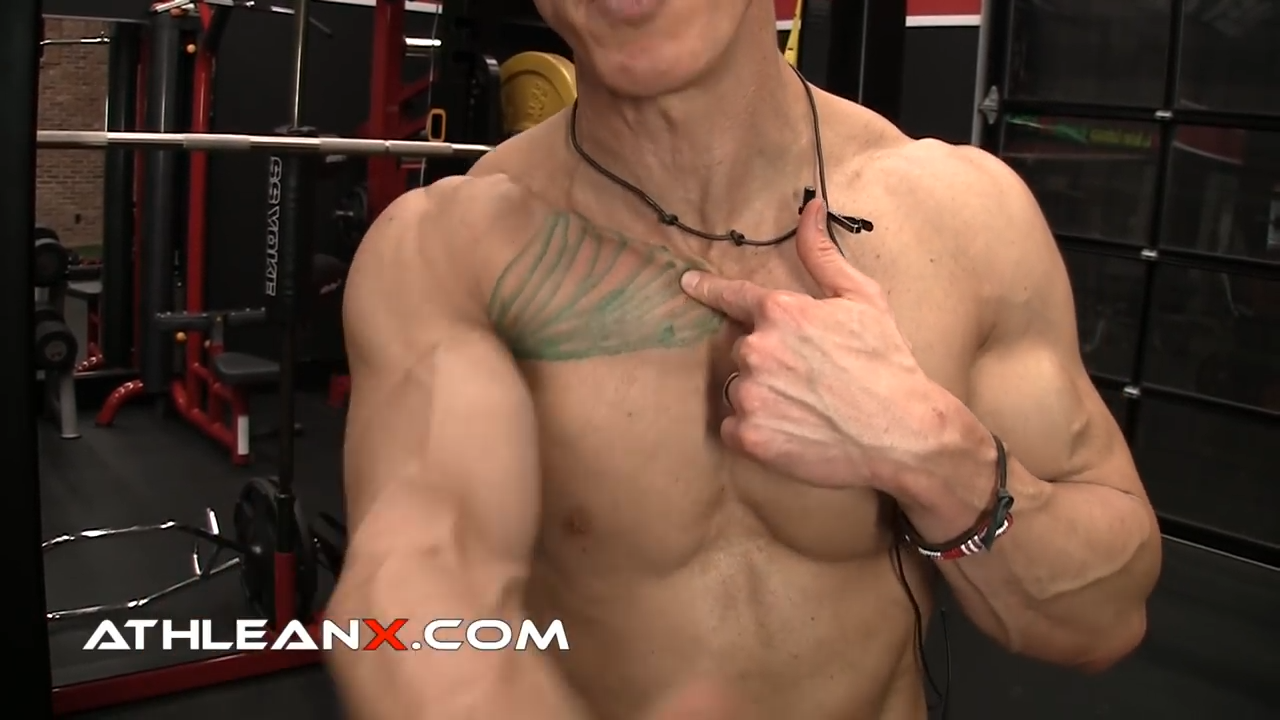
If we can employ effective exercises and workouts that move the arm in the same direction that the muscle fiber runs, we can effectively target the upper chest muscles and increases chest engagement.
How can you target the upper chest?
The upper portion (or clavicular head) of the pectoral muscle is separately innervated from the sternal head and the abdominal head, and its muscle fibers run from up and in toward the clavicle to down and out toward the upper arm. If you choose a variety of exercises in which your arm is placed at the side and away from the body and move the arm up and across the body at a diagonal upward angle, you will be able to get muscle activity in the upper portion of the pecs.
Most good upper chest training sessions would include the dumbbell incline bench press (performed with dumbbells, not an incline barbell bench press. But this is a great example of an exercise for the upper chest that takes the arm through some, but not all, of that range of motion.
The initial orientation of the arms is great when you are incline pressing. As you can see, the angled bench is set to a 30-45 degree incline angle (30 degrees is best) to allow you to hit the upper chest fibers preferentially. When you perform a standard bench press on a flat bench with no degree of incline, you’d be hitting middle chest, whereas with a decline bench press with a decline bench angle, you’d be hitting lower chest. If we’re looking at bodyweight exercises, a decline push-up position would train upper chest muscles, while incline push-ups would train lower chest.

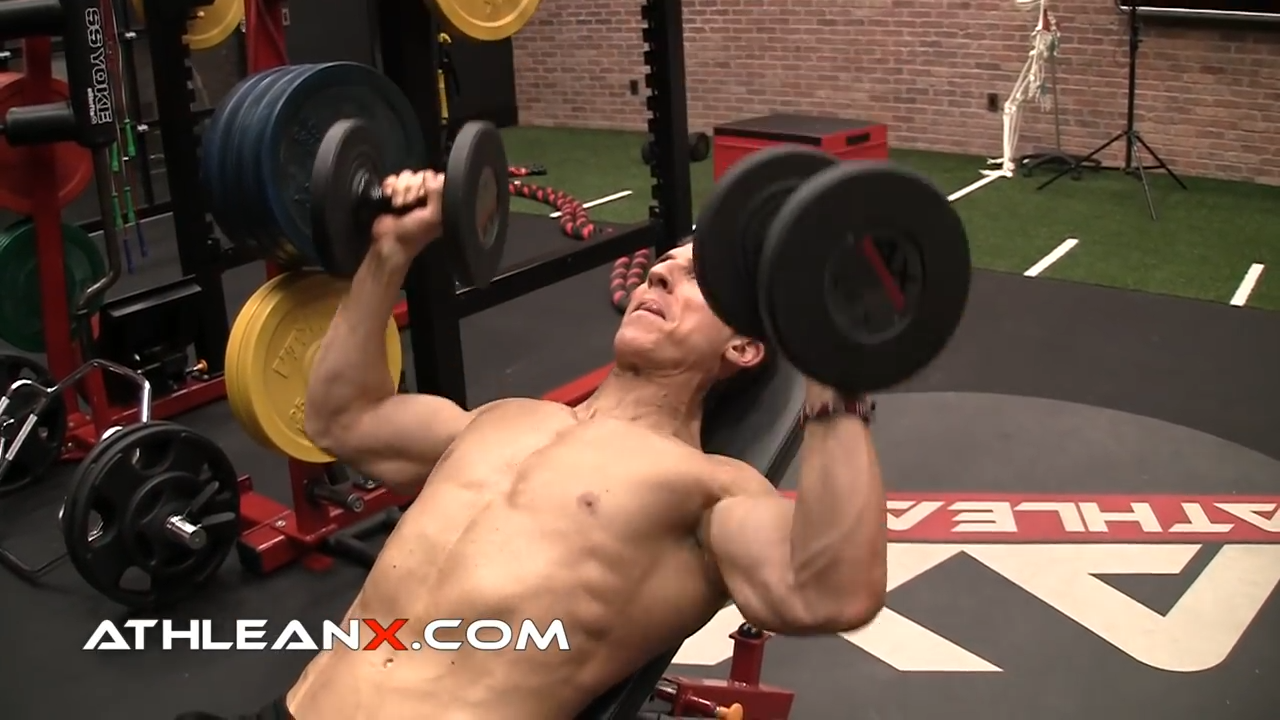
It can be hard to tell when you’re laying on the adjusted flat bench in an inclined position that the arms are not pressing at a perpendicular angle to the chest, but angled somewhat up from perpendicular. If you sit up from lying on the flat bench but keep your arms in the same position you can visualize this.

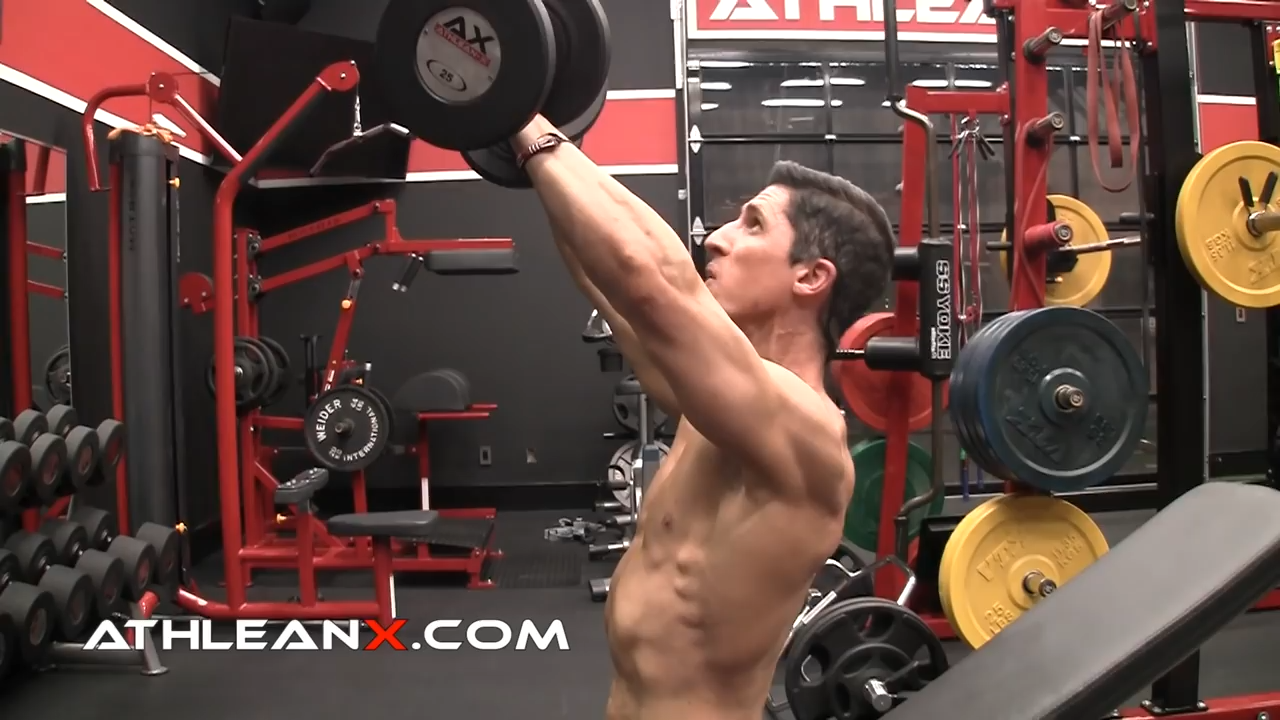
However, the incline dumbbell press does have some limitations. If you could choose exercises that include the same angle of the arms and also incorporate some adduction into the movement, you would be able to get a much better chest contraction.
In other words, if the arms are moving up and in, you’ll be able to better target the fibers of the upper pecs.
I’m going to show you 8 exercises that you can add to your chest workout routine that follow exactly this movement pattern to help you build a bigger upper chest.
8 BEST UPPER CHEST EXERCISES
Now that we’ve covered the anatomy and direction of the fibers, I’ll help you leverage that science to work to your advantage as I always do!
Below you’ll find cable, resistance band, dumbbell and bodyweight upper chest exercises that you can incorporate into your chest workouts. Here’s a quick preview:
BEST EXERCISES FOR YOUR UPPER CHEST WORKOUT
- Dual Cable UCV Raise
- Upper Chest Dip
- Pushaway Pushup
- Sunrise / Sunset
- Upper Chest Upper Cut
- Lean Back Cable Presses
- Jammer Press
- Landmine Rainbows
Before we continue, I want to make it clear that you do NOT want to pile all of these exercises together into a single targeted ‘ultimate upper chest workout’. You should be including some of them into your chest workout routines as part of a comprehensive science-based training plan, like I do in my ATHLEAN-X workout plans.
You want to be sure that science takes center stage not only in your chest workout routines, but in every workout you do.
Here are the 8 best exercises that incorporate these principles to help improve your upper chest development!
1.) DUAL CABLE UCV RAISE
First up is an exercise variation of the UCV raise, which is usually done with a dumbbell. I like this cable crossover exercise because it incorporates that preferred movement pattern we’ve been talking about.
This time we’re going to be working both arms simultaneously with a cable crossover exercise.
This basic exercise takes advantage of a PNF or proprioceptive neuromuscular facilitation which is a physical therapy based principle that encourages our bodies to move as they neurologically prefer to move.
This is good news if you’re trying to get better recruitment of the upper chest fibers, which is exactly what we’re after!

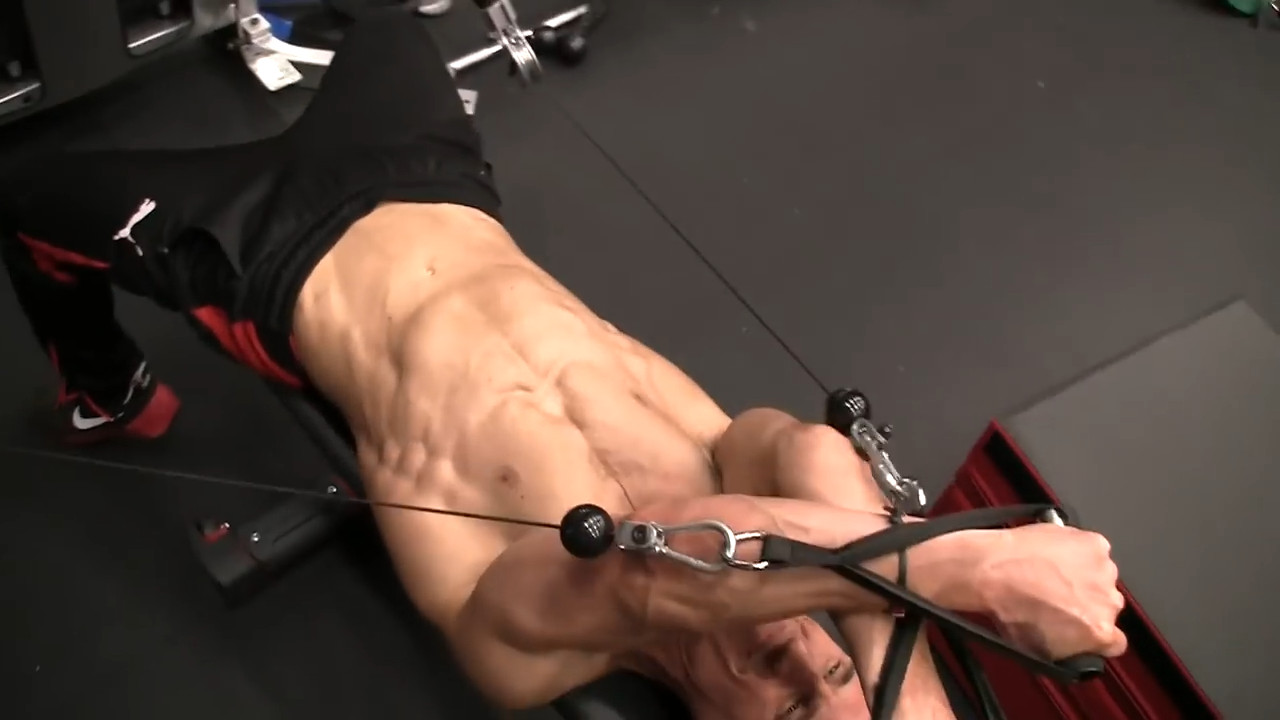
HOW TO DO THE DUAL CABLE UCV RAISE:
- Starting position is lying on a flat adjustable bench or other elevated surface in front of the cable crossover station, shoulder blades tucked under with your arms at your sides held slightly away from the body.
- Adjust the cables of the cable crossover station so that they are low to the ground. Perform cable crossovers up and across the body with both arms at the same time to get that adduction movement and full chest contraction during this cable crossover exercise. Maintain a slight bend in the elbows.
- Don’t allow the chest to cave in, but instead stick the chest out as you cross.
- Slowly lower the cables and repeat.
- Keep your core tight the entire time and use proper technique.
2.) UPPER CHEST DIP
The next exercise is an advanced twist on the dip, which is a classic exercise for building your lower chest. The dip follows the fibers in a different direction to hit the abdominal head of the pectoral muscle.
However, there’s a way we can change the way we do the dip to preferentially hit the upper pecs. And no need for a dip station!
But I won’t lie. It’s hard!
This is a tough exercise option for the upper portion of the entire chest muscle and upper body strength, but if you’re up for the challenge it’s definitely worth it.

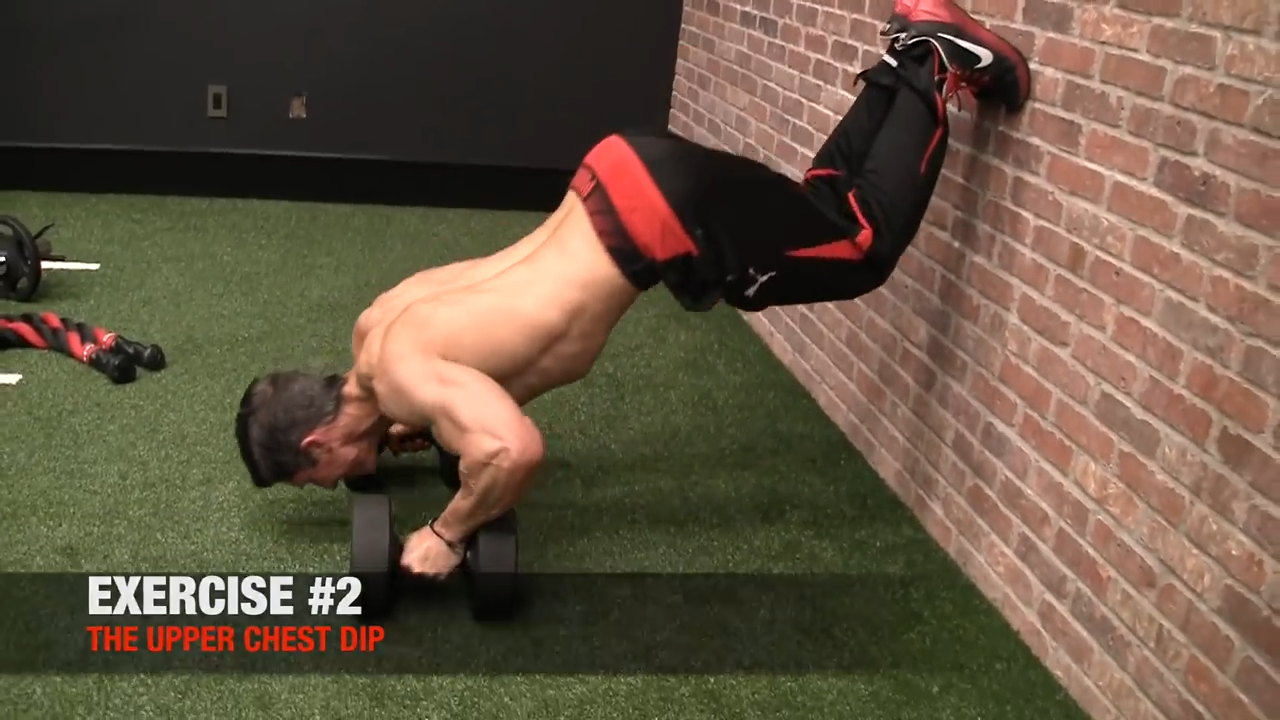
HOW TO PERFORM THE UPPER CHEST DIP:
- You’ll need a pair of dumbbells for this, but you’re not going to be lifting them as extra weight. Instead, starting position is placing them on the floor and hang onto them with your hands, with your feet walked up the wall behind you.
- Mimic a dip, coming down and pushing yourself back up, similar to decline pushups. You’ll see that your arms are in exactly that correct position to target the upper chest.
- As you come around to the front, try to really squeeze. Even better, if you have the ability you can roll the pair of dumbbells ever so slightly toward each other to get a little more horizontal adduction.
- Be sure to perform this exercise with proper form and keep your core tight to avoid risk of injury.
3.) PUSHAWAY PUSHUP
We have another bodyweight upper chest exercise that’s slightly easier than the last, but no less effective. This pushup variation is a great body weight option if you’re doing a home workout for chest.

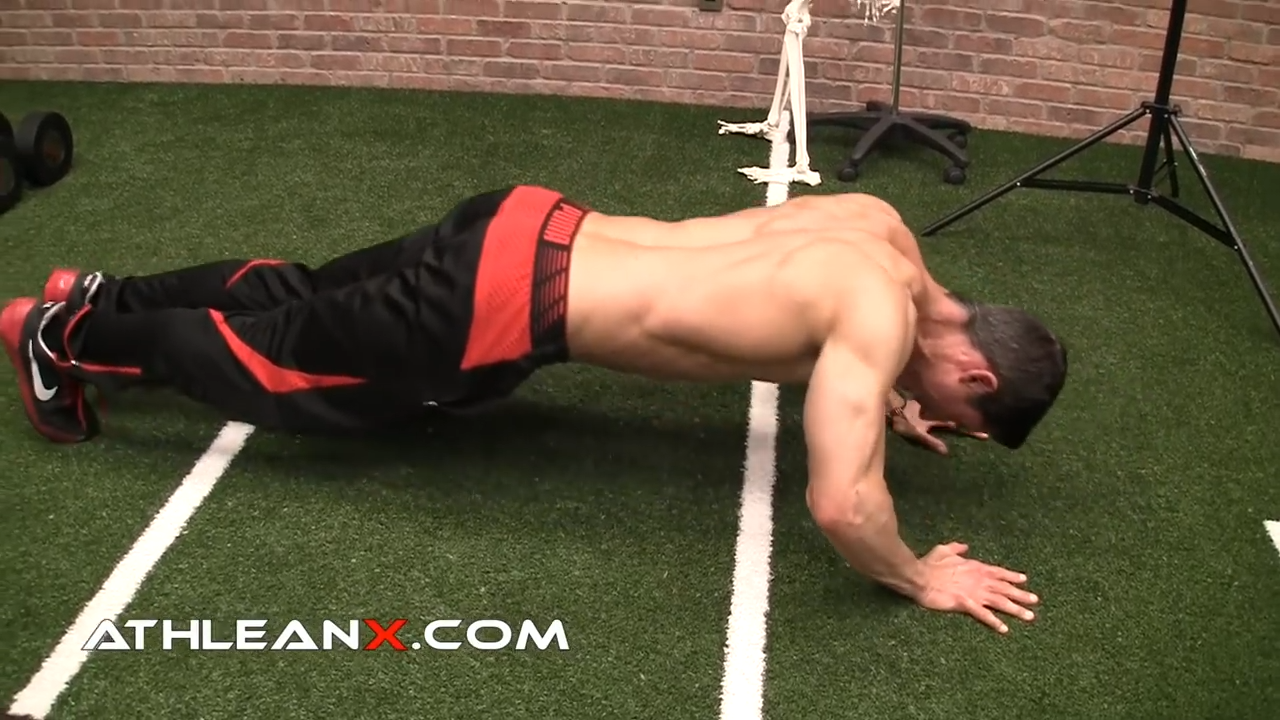
HOW TO PERFORM THE PUSHAWAY PUSHUP:
- As with regular push-ups, starting position is push-up position (plank position). However, in the Pushaway Pushup, the initial position of the arms is not vertically directly beneath your chest but out in front of you a little bit.
- When you push your body back up, it’s not directly up but up and back so that you’re targeting the upper pecs.
- In addition to pushing back, actually squeeze your biceps together to get some adduction and an intense contraction in the upper pecs.
- If this exercise variation feels too difficult, you can shorten the position by hiking your butt in the air into a pike pushup or an incline pushup, which will still target the upper chest.
- Maintain core stability throughout and proper technique this exercise variation of the traditional push-up.
4.) SUNRISE / SUNSET
I really love this next exercise because you’re getting the upper chest contraction when your arms come up from below and also when they come back down from above. The resistance band provides constant tension throughout the exercise. This exercise can be done almost anywhere with minimal equipment.

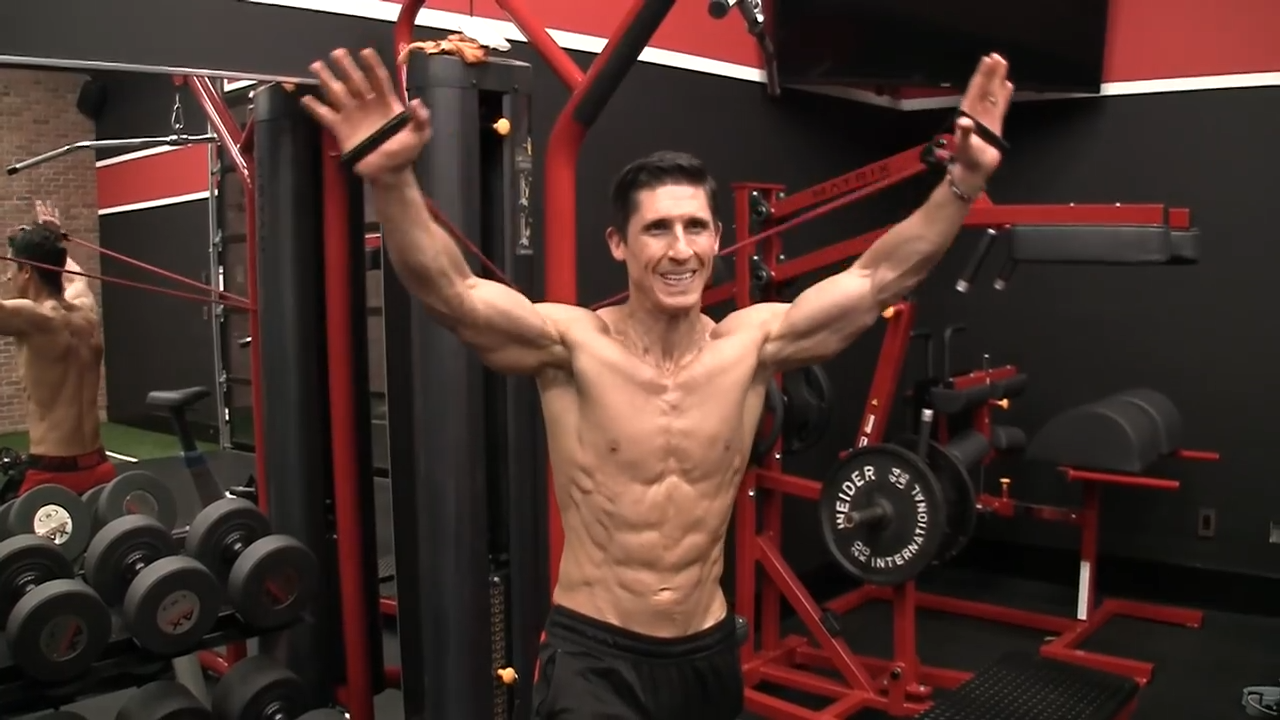
HOW TO PERFORM THE SUNRISE/SUNSET:
- Starting position is standing with feet flat, shoulder width apart, with a resistance band anchored behind you at chest level.
- In the ‘sunrise’ portion of the arm movement when the arms are moving up, they’re following the fibers as they come from the low outside position up toward each other at the top position.
- When you reverse into sunset position in a sweeping motion, you come out to the side and back down, diving in from the top. Maintain a slight bend in the elbows throughout the sunrise and sunset portions of the movement.
- As we’re driving the arms down, we’re finishing in the contracted position with arms angled up and an added internal rotation of the arms that can intensity the chest contraction as well.
- Keep your core tight and use proper technique throughout the exercise.
5.) UPPER CHEST UPPER CUT
If you’re looking for an exercise that will allow you to incorporate moderate weights or heavy weights, this next option fits the bill. That’s because it allows us to shorten the range of motion and the moment arm, making it possible to load the upper portion of the chest more effectively for muscle hypertrophy.
Using heavy loads on the cable machine for this exercise allows us to use a consistent line of force because the cables can follow our movement all the way up.

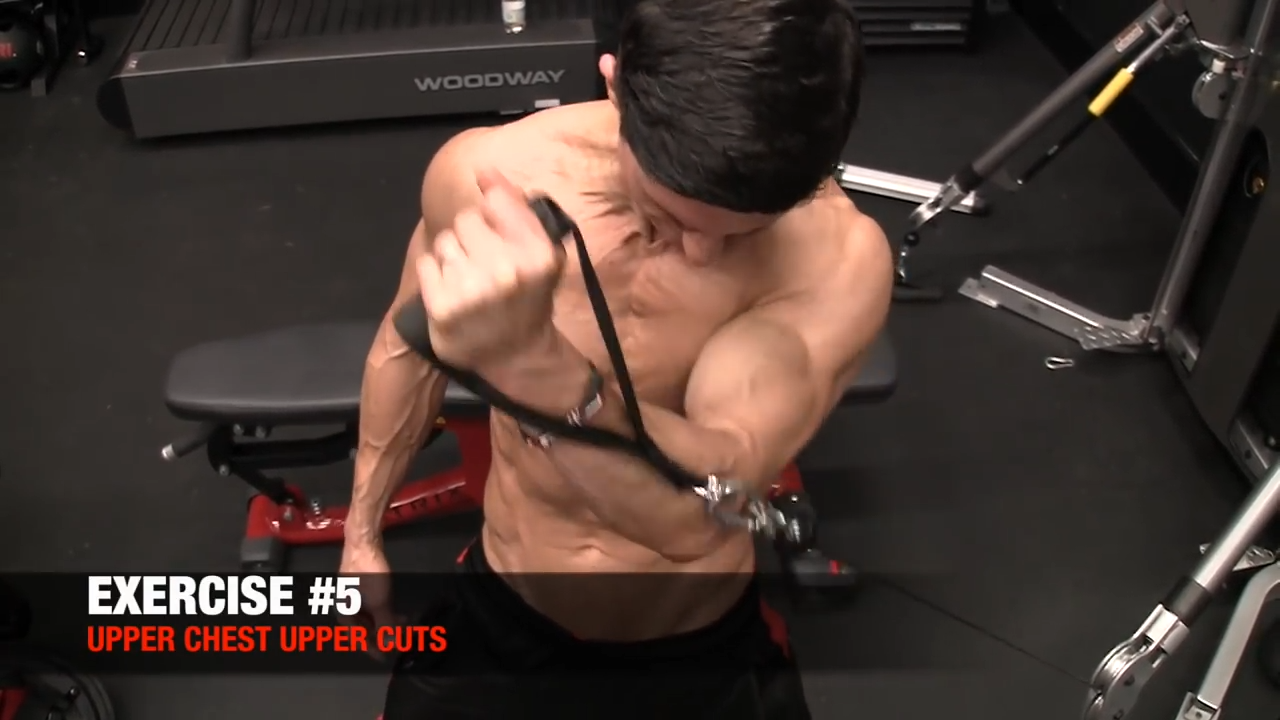
HOW TO PERFORM THE UPPER CHEST UPPER CUT:
- Starting position is with your elbow at your side next to the cable machine with the cable set to a low point, and drive it upward until it’s in front of your chest.
- You should feel a strong contraction in the upper chest.
6.) LEAN BACK CABLE PRESSES
If you’ve got access to cable stations, this exercise variation is definitely worth adding to your workouts. For this exercise we’ll take incline bench pressing and add a small tweak to it to make it infinitely better!
I promise you’re going to feel this more than you’ve have felt on any other incline dumbbell bench press you’ve done before!

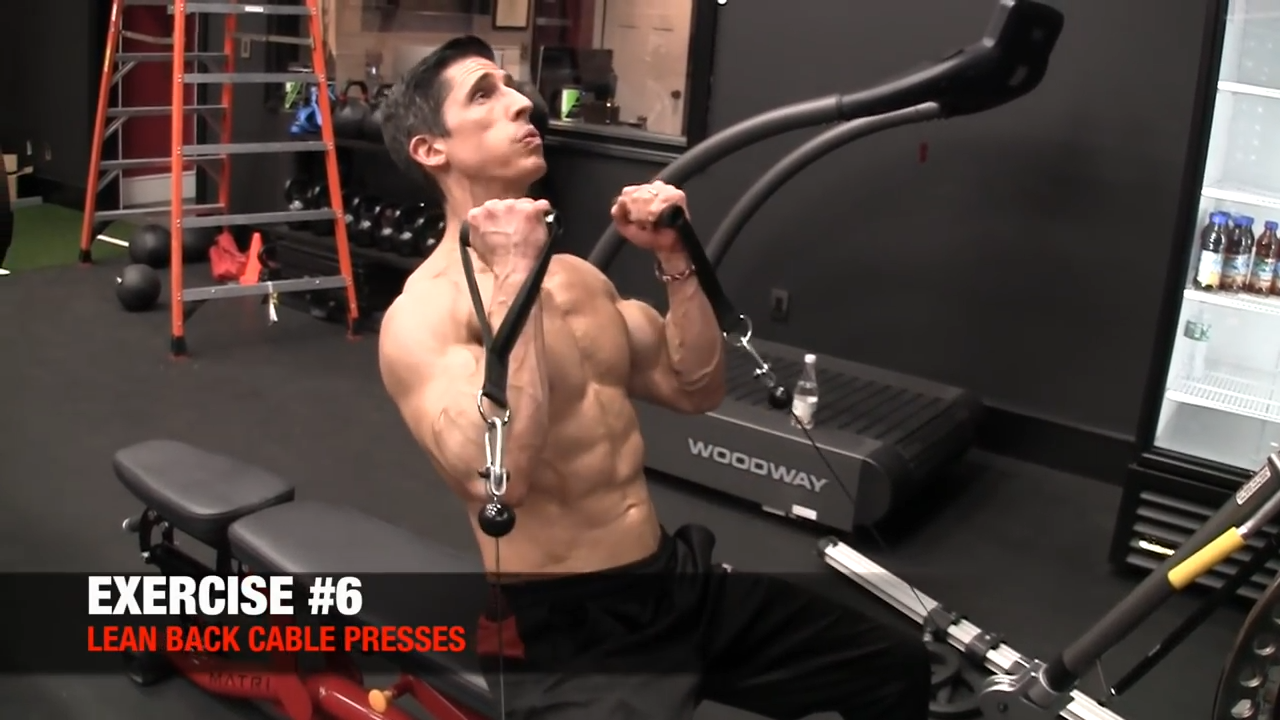
HOW TO DO LEAN BACK CABLE PRESSES:
- Starting position is sitting at the end of an adjustable bench or other elevated surface close to the cable machine and leaning back slightly above 20 or 30 degrees. That places your arms in the correct position to hit the upper pecs.
- The cables provide forward resistance. They want to pull your arms down and forward, forcing you to resist and pull back.
- You’ll have to drive your arms up against resistance with the cables, whereas with a pair of dumbbells alone, they’re only being acted upon by gravity.
- Make sure you lean back in this incline cable exercise. If you don’t lean back, you’ll shift the focus away from the upper chest, giving you more of a shoulder workout instead.
- Keep your core muscles tight and use proper technique throughout the exercise.
7.) JAMMER PRESS
Next, I wanted to provide you with an athletically explosive option for your upper chest training.
Yes, it’s possible…
You don’t always have to pin yourself down on a flat bench to train your chest. The first step to being more athletic is being on your feet!
You’ll need a jammer machine for this exercise, which not every gym has. But if you do have access take advantage of it, because this exercise places you in the correct position to build your upper chest.
Conversely, if you sit down on a weight bench and press straight up, you’d be hitting the shoulders. It also doesn’t allow you to be explosive or athletic because you’ve taken your feet and legs out of the equation.

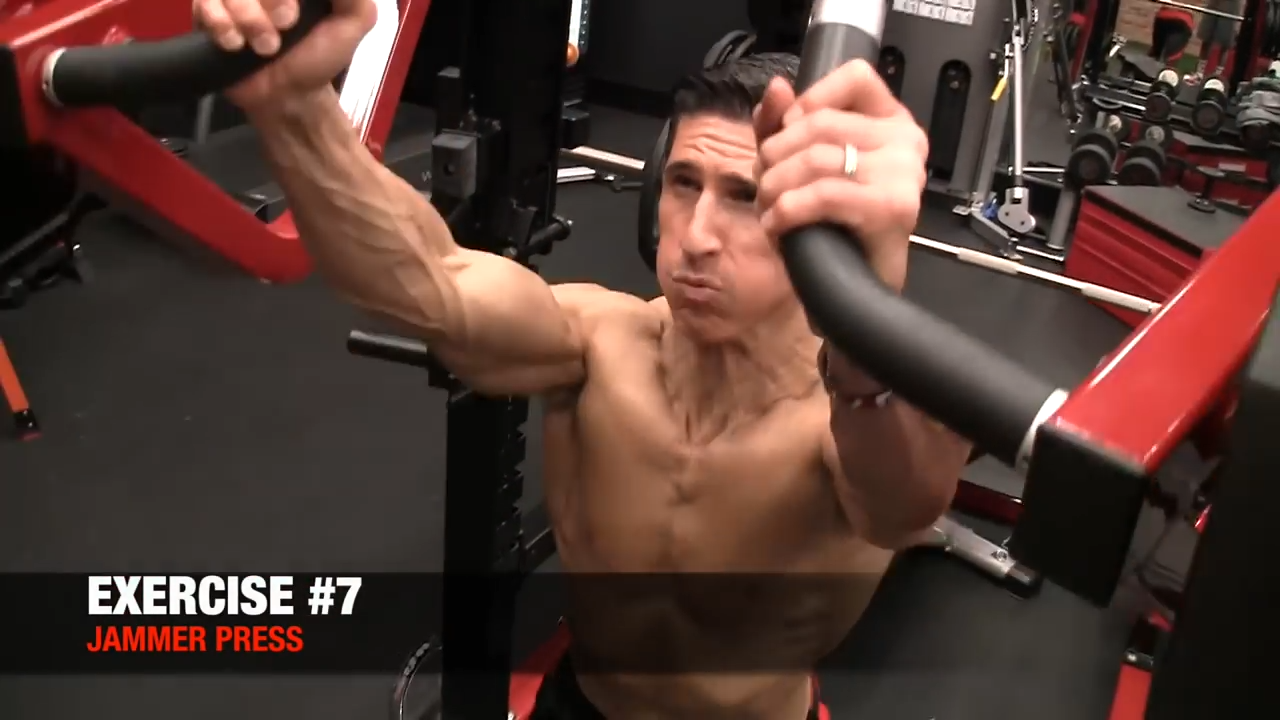
HOW TO DO THE JAMMER PRESS:
- Load up the weights on the jammer machine.
- Start with feet in a split stance to give balance and stability, standing in front of the jammer machine.
- Perform overhead presses by driving and accelerating the weights upward.
- Return to the starting position and repeat.
8.) LANDMINE RAINBOWS
I saved my absolute favorite for last!
You’ve probably seen a one-armed dumbbell shrug which shortens the moment arm of the pec major and allows you to use heavier weights to hit the upper chest muscle fibers. You can opt instead for these Landmine Rainbows, which allow for a smooth arcing motion and a much larger range of motion than that shrug.

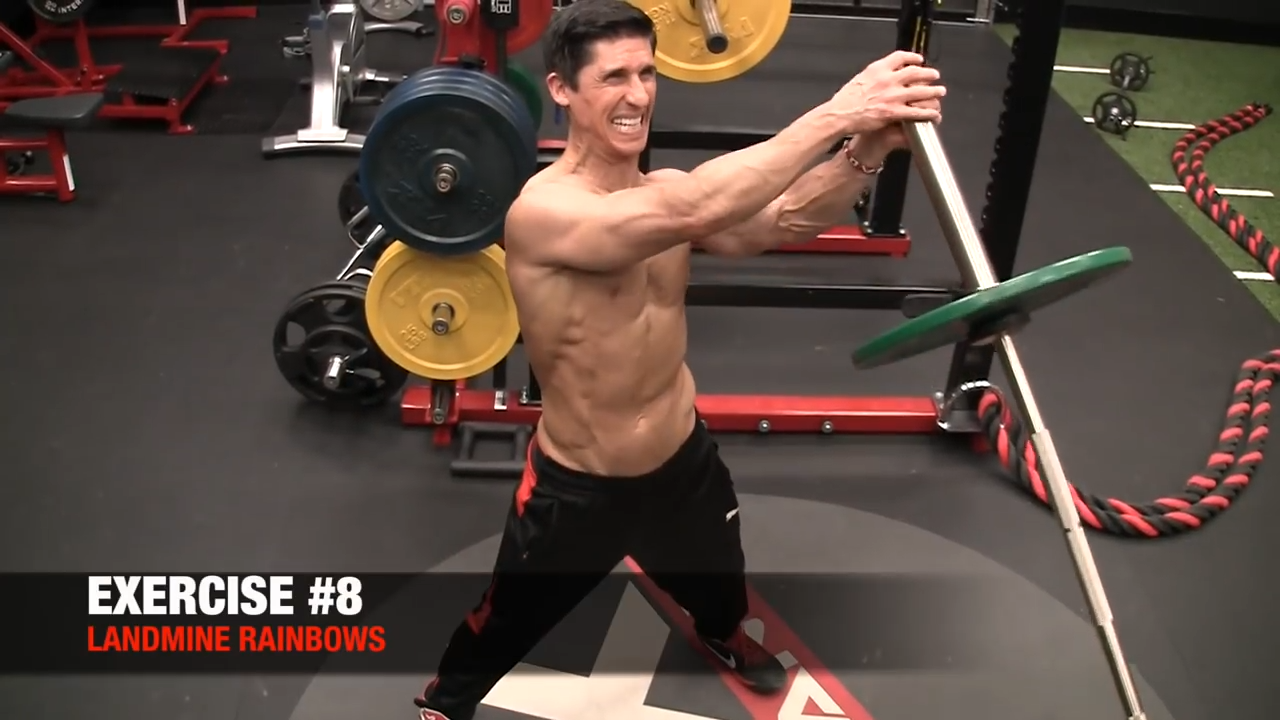
HOW TO DO LANDMINE RAINBOWS:
- Don’t allow the torso to rotate with the arm as it drops down to the side.
- We’re trying to increase the moment arm in this exercise to take advantage of the arc that the landmine provides.
- When you get to the top, contract and squeeze and then switch hands.
- Continue alternating right and left.
I’ve provided you with 8 great exercises to get an upper chest workout at home, an upper chest cable workout or an upper chest workout with dumbbells. If there are any workout tips I want you to take away from this, they are to follow the fibers and make sure your upper chest workout routine includes adduction.
As you can see, it’s incredibly important to make 100% sure that science factors into your exercise selection, not only for the upper chest but in every single workout you do. I can help you maximize your training effort and apply science to the entire body by training every muscle like it matters. Because frankly, it does! Train like an athlete leaving nothing to chance when it comes to your individual goals!
Check out our ATHLEAN-X programs to see which is the best fit for your fitness goals and fitness level. Let me be your coach and I’ll help you wherever you are on your fitness journey.
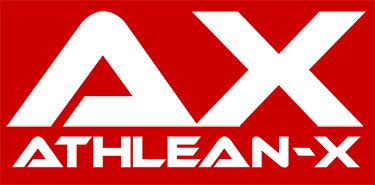
- The upper chest is separately innervated from the rest of the pectoralis major muscle, making it possible to target it more specifically than other areas of the chest.
- Most workouts to build upper chest will include the incline dumbbell press, and while it places the arms in a good position for hitting the upper pec muscle, it lacks the adduction that creates a better chest contraction. Not involving adduction in your upper chest training is a common mistake that can hinder your upper chest growth.
- I’ve given you 8 great upper chest exercises that include both the preferred arm position as well as adduction to help you get the best possible upper chest workout for mass.
UPPER CHEST WORKOUT FAQS
To achieve upper chest activation and build muscle mass and muscle definition in the upper chest you'll need to use exercises that preferentially hit the upper portion of the chest muscle fibers such as an incline barbell bench press, an upper chest dip or a jammer press. Any of these will allow you to achieve chest gains by providing an opportunity for progressive overload and workout intensity. It's best to train chest 1-2 times per week, not more frequent training, to allow for proper rest. Adequate rest time is the cornerstone of muscle repair. You should include exercises that achieve muscle activation in all of the portions of the target muscle, including upper chest, middle chest and lower chest portions of the pectoralis major as well as the pectoralis minor muscle to allow for muscle gain. Be sure to include a balanced diet including sufficient protein for recovery and the repair process, to allow for maximal muscle growth and upper body development. You'll want to be sure you are meeting your daily protein requirements with multiple sources of protein. Ensuring you are getting at least 7 hours of sleep per night is also crucial for recovery.
On chest days, doing 2 upper chest exercises is probably not too much if you want build a strong chest and an impressive pair of pecs. It's best to train chest 1-2 times per week, not more frequent training, to allow for proper rest. This should include exercises that achieve muscle activation in all of the portions of the target muscle, including upper chest, middle chest and lower chest portions of the pectoralis major as well as the pec minor muscle to achieve chest gains.
To achieve strength gains and build muscle mass, you should opt for 1-2 chest days per week (not more frequent training) to allow ample time for recovery of muscle soreness, and this would include upper chest exercises. Your chest workouts should include exercises that achieve muscle activation in all of the portions of the target muscle, including upper chest, middle chest and lower chest portions of the pectoralis major as well as the pectoralis minor muscle.
To achieve a well-developed chest and build upper body strength, you'll want to do 1-2 chest training sessions per week (not more frequent training) to allow for proper rest for recovery. Your chest workouts should include exercises that achieve muscle activation in all of the portions of the target muscle, including upper chest, mid - chest and lower chest portions of the pectoralis major as well as the pec minor muscle. You'll want to choose exercises that allow for progressive overload, so that you can achieve more chest gains over time. Be sure to adopt a well-rounded diet for muscle growth with sufficient protein to help with muscle protein synthesis. Ensuring you are getting enough quality sleep is also crucial for recovery.
To work the upper chest region and achieve muscle activation in the upper chest, you'll need to use exercises that preferentially hit the upper portion of the chest muscle fibers. Some common chest exercises for upper chest would be an incline barbell bench press, overhead presses, an upper chest dip or a jammer press. Other exercises might require a cable machine, or an adjustable bench with bench angles. You should try to train arms 1-2 times per week to allow ample muscle recovery time between sessions for muscles to repair themselves and grow.
Most chest exercises work the entire chest and even include some other upper body muscles, but if you want to achieve upper chest growth, you'll need to use exercises that preferentially hit the upper portion of the chest muscle fibers such as an incline barbell bench press, an upper chest dip or a jammer press.
REFERENCES
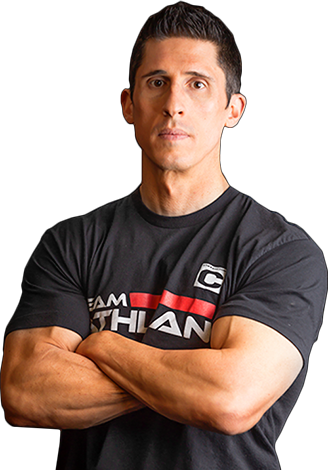
Jeff Cavaliere M.S.P.T, CSCS
Jeff Cavaliere is a Physical Therapist, Strength Coach and creator of the ATHLEAN-X Training Programs and ATHLEAN-Rx Supplements. He has a Masters in Physical Therapy (MSPT) and has worked as Head Physical Therapist for the New York Mets, as well as training many elite professional athletes in Major League Baseball, NFL, MMA and professional wrestling. His programs produce “next level” achievements in muscle size, strength and performance for professional athletes and anyone looking to build a muscular athletic physique.
